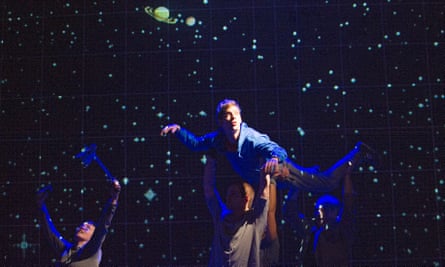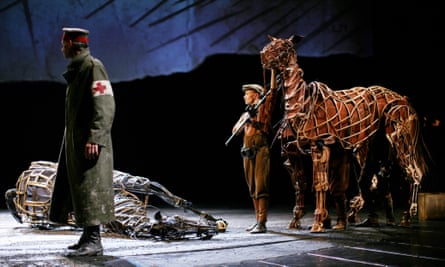Mortality. Nothing quite like the prospect of it to bring laser focus to the mind. I wrote previously of how my incurable cancer diagnosis has compelled me to plan a celebratory concert of my orchestral works. Thankfully, the laser focus has delivered. Six months of relentless writing and orchestration of new pieces including a new violin concerto – somewhat weirdly all done while having 12 lots of chemotherapy – now means that at the Queen Elizabeth Hall in London later this month, the Royal Philharmonic Orchestra, conductor Michael Seal, solo violinist Fenella Humphreys and the London Youth Choir will come together to perform that concert, titled Seize the Day. If you’re able to come along, I’d love to share it with you. It will be a very special evening for me.
The past six months have been an emotional rollercoaster. But strangely fulfilling too. The Guardian invited me to keep a diary.
December 2022
I have to shoot for the moon. If I’m going to do this concert – at what will be a vast expense to me – I need a prestigious London venue, a world-class orchestra, soloist and conductor, and a dynamic programme of my best work to make it worthwhile. Anything less will be a nagging disappointment.
The problem is the short notice. How long have I got to live? No idea. It could be years yet – or just months. It’s not possible to plan with any confidence. So I need to get cracking and do this, but orchestras and venues typically operate on far-in-advance schedules, meaning that snapping together an orchestra and venue for one date in the next few months is looking like an unrealistic prospect.
Thankfully, I have Sam Weatherstone, a producer who specialises in this kind of thing. Sam does some ringing round and before long I’ve got a shortlist of dates. Very short. Ultimately – after considering how much preparatory work has to be done – there’s only one date that works. So I pick it: 28 June.
Next thing: the repertoire. A whole evening’s worth of stuff. Not all of it is written yet – most dauntingly, the violin concerto; something I’ve wanted to tackle since my 20s but which right now only exists as fragmentary ideas on a few scraps of manuscript. If I want it in this concert, I’m staring at the prospect of four or five months of hard, focused work on that one piece alone. But I’m one of those composers that’s only productive at gunpoint. So it’s probably just as well.
January 2023
A post-Christmas present of sorts: a CT scan confirms the first six rounds of chemo haven’t been futile; the tumours have shrunk somewhat. So horizons open up a bit – for now anyway. And the side effects have been very manageable thus far, essentially just fatigue, meaning only that post-treatment weekend plans have to be kept modest.
It turns out that the chemo suite is a great place to get orchestration donkey work done. That is, if your inner ear can blank out Radio 2 and the gentle alerting beeps of everybody’s infusion pumps. I have to sit here for most of the day every other Monday, so I might as well make good use of the time while receiving my cytotoxilicious goodness. One of the concert’s pieces (Short Story) ends up being written and orchestrated entirely in the chemo suite.
I make lots of social appointments this month with friends and colleagues, many of whom I’ve not seen for way too long. They’re desperate to know how I am, so I explain the diagnosis details to each of them. I don’t mind in the least; but it occurs to me to set up a WhatsApp broadcast list of friends and family to disseminate the occasional salient update on my progress. Importantly, it’s not a WhatsApp group where everyone gets to comment and things quickly become chaotic.
February
After the emotional tailspin of the past few months, our household is slowly starting to stabilise as we adjust to the new reality. Though I’ve always been a big foodie, I lost interest for a while – not because of the chemo (which is accompanied by steroids, so I’ve been eating like a horse) but because life temporarily seemed to lose purpose. Purpose is back. We buy indulgently expensive frying pans and melt a lot of butter in them. Life’s pleasures take priority.
The concerto is taking shape. Initially, a friend suggested that in order to keep the workload down, it could be conceived as a partner piece to Vaughan Williams’s The Lark Ascending, a single-movement work lasting about 15 mins. This idea gets me going for a while, but it soon becomes apparent that it “wants” to be something more dynamic and substantial. It ends up as a three-movement work of 24 minutes, a proper concerto.
One conceptual link remains with the Lark; while the latter is about a bird over land, this piece is about a bird over the ocean – a gull. I’m finding that I’m keeping images and story elements from Richard Bach’s 1970 novella Jonathan Livingston Seagull in mind. Only in a very loose sense, but it’s proving a useful blueprint to drive the writing forward.
March
The concerto takes less than a third of a 90-minute programme, so I need to make sure the other repertoire is in shape. Some of it – War Horse for example – has already been performed by orchestras several times. But this concert is also a showcase for other works that don’t normally get to see the light of day. So I’m adding to Orchestral Miniatures; a suite of short pieces, some of which derive from my theatre scores (including some previously unheard, unused material). Polperro Beach from The Curious Incident of the Dog in the Night-Time is one such candidate; a brief moment of serenity in what is otherwise a turbulent and frenetic electronica score.

I’ve never been so productive in my life. I’ve spent the past six months doing nothing but writing and arranging orchestral pieces, and the work rate is brutal. The time taken to do orchestration is reasonably predictable, but the sketching – the basic musical ideas and their progression – takes much longer. I try to hold myself to a fixed minimum number of bars per day, but some days, I can end up rubbing out more bars than creating new ones.
But there’s something that has felt very wholesome about creating things that I can put in front of a symphony orchestra, chamber group or choir, both for this and future concerts, knowing that real people will be bringing my music to life right there in the room.
An unexpected and heartwarming affirmation of that very same thing arrives in another form: a request from a music exam board for permission to include two of my piano pieces in their 2023 grades repertoire. Now I’ll be performed in private living rooms all over the country, too. Hopefully not too grudgingly.
April
Another CT scan. More tumour reduction, hurrah. Though the oncologist reminds me again that it will never go away. For now, I get a chemo holiday; a so-called “surveillance” stage. The PICC line installed into my upper arm for the infusions can come out. Every three months I’ll have to have another scan to see if things are behaving – or not. Until the “or not”, a faintly-cruel normality will prevail, as if nothing had ever happened.
One thing I’m supposed to be using this chemo break for is to relax as much as possible. Fat chance of that with all this concert work, and next month, something else gets added to the pile. Rehearsals start for Dr Semmelweis at the Harold Pinter theatre in London; a show I wrote the score for last year. I’ve not been able to commit to a full tech and preview schedule, but it’s wonderful to feel engaged and needed in the world of theatre work again.
May
It suddenly dawns on me that with all my magnified efforts and attention burning a smouldering hole into 28 June on my calendar, it would be easy to forget about the psychological cliff-edge waiting for me, post-euphoria, on the morning of the 29 unless I get my ducks in a row.
There have been points during the writing of these new pieces where I’ve caught myself wondering whether I’ve inadvertently infused them with a melancholy that normally wouldn’t be there; an air of finality or whatever. But I soon snap out of that and come to my senses to remind myself: this concert is not a swan song. It’s a celebratory stock-take of where I’ve got to and what I’m proud of.
Straight afterwards, I’m resolved that the path should continue, but narrow down even more to focus on making music for real humans that is enjoyable and rewarding both to listen to and to play. I cannot know the length of that path for me, but I don’t care. I know it’s worth it.

